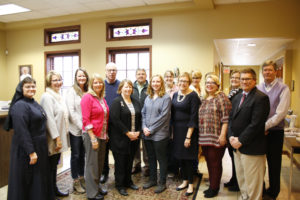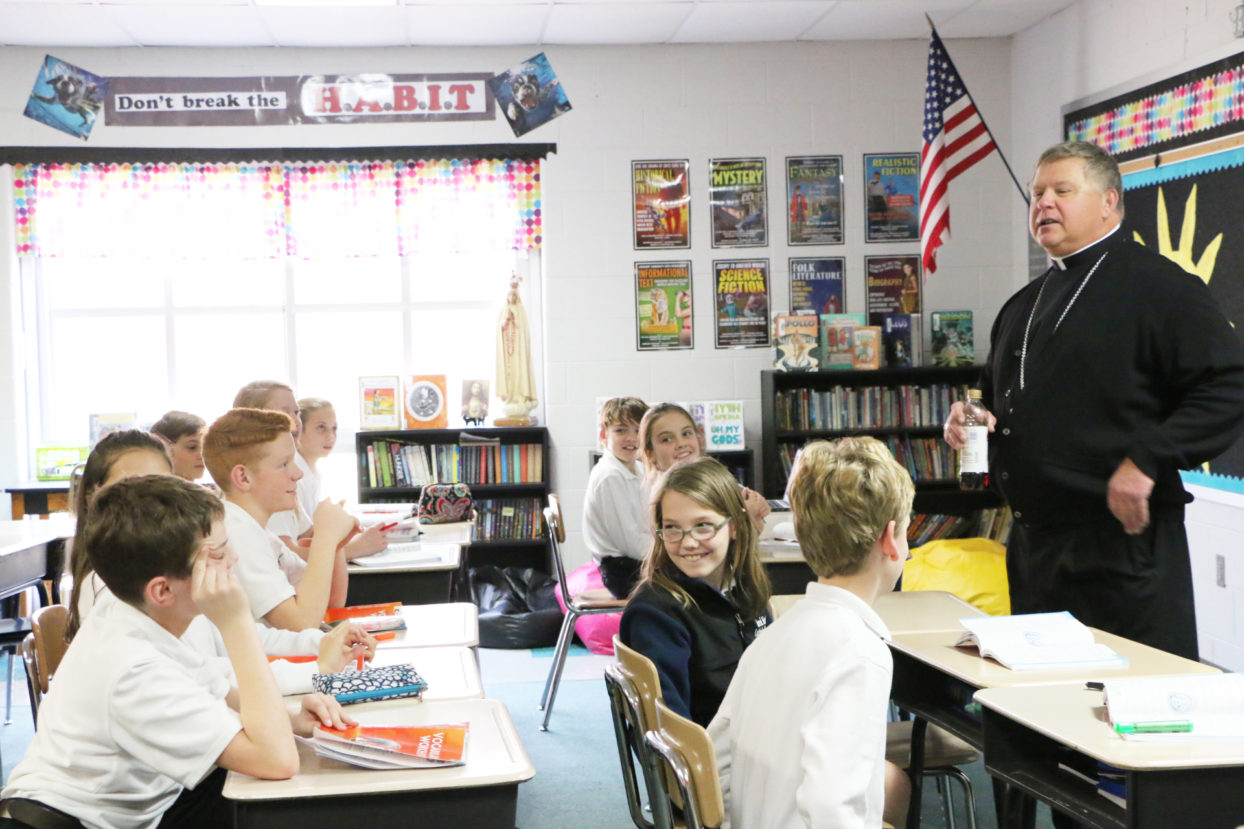The Diocese of Knoxville school system is being reviewed by AdvancED for certification as a system of excellence
By Bill Brewer
Diocesan-wide schools accreditation, a project Diocese of Knoxville education leaders have been working on for two years, reaches a critical phase this month.
The diocesan school system is officially being reviewed by AdvancED for certification as a system of excellence. During February a team of education professionals will visit all 10 schools in the diocese. The team’s lead evaluator, Louisville Archdiocese schools Superintendent Leisa Schulz, who made a pre-evaluation visit to the diocese Nov. 21, returns with her entire team of superintendents, principals, and other central office personnel from various dioceses and archdioceses to evaluate the schools Feb. 21-22.
The categories under which Diocese of Knoxville schools will be assessed include mission and Catholic identity, academic excellence, governance and leadership, and operational vitality.
Sister Mary Marta Abbott, RSM, superintendent of diocesan schools, recently submitted a final report from the diocese to AdvancED on the 10 schools.
Immediately following the review team’s evaluation later this month, a culminating exit report will be presented to Bishop Richard F. Stika, priests, school leaders, and other stakeholders Feb. 23. Following the quality assurance review, the team will make its final accreditation recommendation.
“The review team will tell us what we’re doing well and what we need to work on,” Sister Mary Marta said. “We know we need to improve our marketing. But I’m confident we will be accredited.”
While nine of 10 Diocese of Knoxville schools already are accredited by AdvancED, Sister Mary Marta has said it is equally important for the school system as a whole to be accredited by AdvancED.
“We’re trying to move from a system of schools to a school system. That will make us all aware as a diocese of where we’re going and what our focus is,” Sister Mary Marta has said, noting that the diocese recently approved new mission and vision statements for the school system as part of the accreditation process.
The mission is “The Catholic Schools of the Diocese of Knoxville prepare scholars, leaders, and saints.”
The vision is “Empowered by the Holy Spirit and recognizing the vital ministry of Catholic education to the future of the Church and nation, we will provide a learning environment that emphasizes quality education and spiritual growth for all.”

Members of the Diocese of Knoxville AdvancED steering committee include principals, assistant principals, and lead teachers.
The 10 schools currently serve 3,185 students in 36 counties throughout East Tennessee. Students come from both Catholic (84 percent) and non-Catholic (16 percent) families, with an ethnic mix that is approximately 87 percent Caucasian, followed by 9 percent Hispanic, 4 percent Asian, and the remaining ethnic groups at 1 percent or less than 1 percent each. Approximately 47 percent of the students are male and 53 percent female.
Schools data also show that the socio-economic status of families with children in school ranges from wealthy to poverty levels, with 30 percent of the students receiving tuition assistance through parishes or diocesan regional funds. The schools strive to hold down the cost of tuition to make Catholic education affordable for all families while still trying to provide a just wage for school personnel. Even though tuition is the main source of funding, schools have additional revenue through fundraising efforts largely conducted by parent and school communities. St. Mary’s Legacy Foundation grants have recently awarded some schools monetary grants for school improvements and upgrades such as technology upgrades and equipment purchases.
According to diocesan schools data, preschool programs have increased the number of potential students for elementary schools, as well as providing an important service to Catholic communities. All eight elementary schools have a preschool program.
There are regional differences in the diocese that affect enrollment levels in schools. These differences include competition, a rise in secularism, population size, family financial need, and a lack of a complete preschool/kindergarten through grade 12 for students in certain regions. The vast majority of students who attend a Catholic elementary school continue on to a diocesan high school. However, there is not a Catholic high school available for students in the Tri-Cities area.
Sedonna Prater, director of curriculum and instruction for diocesan schools who is chairing the accreditation process, explained that AdvancED accredits schools throughout the United States and internationally and works in conjunction with its affiliate, the Southern Association of Colleges and Schools, which has accredited Diocese of Knoxville schools on a regional basis.
Mrs. Prater has said it is important for the diocese to align itself with the AdvancED system and standards, which include a wide spectrum of academic benchmarks as well as criteria specific to Catholic schools. Mrs. Prater, Knoxville Catholic High School president Dickie Sompayrac, and St. Jude School principal Jamie Goodhard have served as AdvancED evaluators on teams assessing schools in other dioceses.
AdvancED has been described as changing the way educators and policymakers think about accreditation and accountability by offering a comprehensive analysis of all aspects of schooling to ensure that schools and school systems don’t improve in one-shot measures, but rather progress across many indicators each year.
Sister Mary Marta and Mrs. Prater believe that accreditation is important because it shows diocesan schools are meeting a national standard for excellence.
“They’re really going to be looking at the system. Hopefully they’ll find things we’re doing very well, and they may identify opportunities for improvement. They are required to find an area we must act on,” Mrs. Prater has said.
“Accreditation is about continuing improvement and growth. It’s really a quality-assurance exercise,” she noted. “Our schools will be adhering to a set of standards that are internationally known.”
Mrs. Prater emphasized that most of the diocesan schools are accredited by AdvancED and SACS. Only St. Dominic School in Kingsport is not yet accredited, but it would be with system accreditation.
Diocese of Knoxville schools also are already accredited by the state of Tennessee and have been since they opened.
Sister Mary Marta and Mrs. Prater also noted that it makes better financial sense to be accredited as a system. Now, each of the nine schools must undergo its own accreditation process involving nine evaluation teams and nine visits. But with a system-wide assessment, there will only be one comprehensive evaluation involving only one evaluation team.
“We’ve been working a lot with our steering committees and our school leaders. This process is unifying us as a school system, which is something Bishop Stika has wanted to work toward,” Sister Mary Marta said. “Our mission is to create good citizens and get them to heaven.”
Bishop Stika has issued letters to parents and Catholic schools faculty, offering his gratitude for their support of Catholic education.
“As we conclude celebrating our Catholic schools [in Catholic Schools Week], I would like to take a moment to offer my profound gratitude,” Bishop Stika said. “Looking around the Diocese of Knoxville, it is very easy to notice the positive impact our Catholic schools have on their communities. People like you, who have been involved in our Catholic schools, provide a strong backbone for our diocese. Your involvement makes a difference. No doubt, that involvement is helping our diocese grow.
“As you are aware, the diocesan Catholic schools office is currently involved in the most in-depth self-evaluation ever associated with our schools. The reward for that self-evaluation will be an accreditation by the internationally recognized AdvancED and the Southern Association of Colleges and Schools (SACS). That process has involved internal self-analysis of all aspects of our schools and the way the diocese supports its schools. The process has included the opportunity for stakeholder input, and for some of our school leaders to visit and evaluate other schools and even other diocesan offices. This has helped us identify areas in which we can become stronger. More importantly, it has helped us affirm just how wonderful our Catholic schools already are – because of you,” the bishop said.
“Thank you for your continued support and involvement in Catholic schools. That involvement is making a difference in our children, our families, our parishes, our community, our diocese, and our world.”

